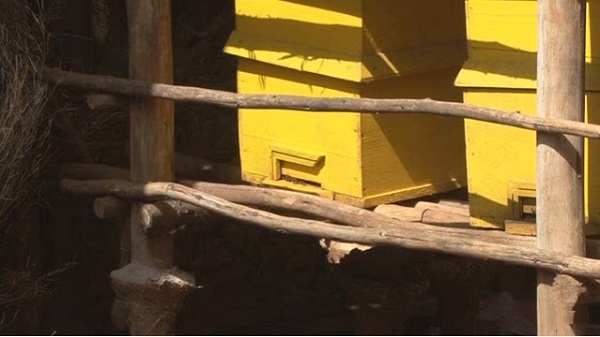
Equipped with the right modern techniques, honey production has the potential to pull thousands of poor farmers out of poverty, experts say. Ethiopian honey farmers do not have such modern techniques.
(AFP)–The beehives of Ethiopia, Africa’s top honey producer, make about a quarter of the continent’s honey, but travelers who come to sample the liquid gold often find there isn’t enough to go around.
In a country where 85 percent of all jobs are in agriculture, industry experts say the beekeeping — or apiculture — sector is still a long way from harvesting its full potential, hampered by outdated, low-yield techniques, periodic droughts and uncompetitive prices.
Honey traditionally plays a big role in Ethiopian life — where its delicious white, red and yellow varieties are used in cooking, for medicinal purposes and as a key ingredient in the local mead known as tej.
The problem is that the majority of honey farmers use outdated styles of beehives that are stored in trees or clay jars.
And these do not produce as much honey as modern wooden boxes, says Juergen Greiling, a senior adviser at the Ethiopian Apiculture Board, an umbrella group for the honey industry.
Equipped with the right modern techniques, honey production has the potential to pull thousands of poor farmers out of poverty, experts say.
Alem Abraha is one such farmer.
He was previously living from hand to mouth as a subsistence farmer, but took up beekeeping full time about 10 years ago.
“My life has been completely changed,” he says, as bees circle his head in the village of Zaena, situated in Ethiopia’s northernmost region of Tigray.
It is on Tigray’s high-altitude mountain slopes that the yellow Adey Abeba flower grows, a key component in making the unique white honey that is one of Ethiopia’s most prized exports.
“If you train farmers to have modern training like I’m doing here, that would transform production,” Alem says.
Tesfamariam Assefa, a coordinator at the Tigray regional agriculture bureau, said the government aimed to boost the region’s honey exports from 50 percent to 80 percent of output by teaching farmers better beekeeping techniques.
Read the complete story at Daily Mail Online
——
See also:
- SNV in Ethiopia: Strengthening Apiculture Input Supply System
- VIDEO: Mama Fresh ― Taking the Ethiopian Staple Injera Global
